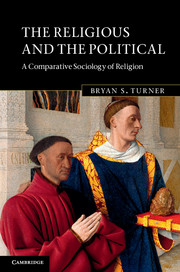Book contents
- Frontmatter
- Contents
- Acknowledgements
- Introduction
- Part I The religious and the political
- Part II State management of religion
- Part III Comparative and historical studies
- 8 Buddhism and the political: the sangha and the state
- 9 Confucianism as state ideology: China
- 10 Religion, state and Japanese exceptionalism: nihonjinron
- 11 State and Turkish secularism: the case of the Diyanet
- Part IV Conclusion
- References
- Index
9 - Confucianism as state ideology: China
Published online by Cambridge University Press: 05 April 2013
- Frontmatter
- Contents
- Acknowledgements
- Introduction
- Part I The religious and the political
- Part II State management of religion
- Part III Comparative and historical studies
- 8 Buddhism and the political: the sangha and the state
- 9 Confucianism as state ideology: China
- 10 Religion, state and Japanese exceptionalism: nihonjinron
- 11 State and Turkish secularism: the case of the Diyanet
- Part IV Conclusion
- References
- Index
Summary
Introduction: Max Weber on The religion of China
In the West there is a long tradition of scholarly interest in the uniqueness of China. For example, in the seventeenth century Gottfried W. Leibniz (1646–1716) devoted considerable attention to the question of Chinese distinctiveness as an aspect of his understanding of the plenitude of reality in his concept of theodicy. He thought that God had created a world of infinite variety, and that the diversity of cultures was simply one aspect of this enriching multiplicity. In this specific sense he argued that we live in the best of all possible worlds. His ambition was to create a ‘commerce of light’ to match the exchange of commodities that already existed between Europe and Asia (Perkins, 2004). Despite this early flowering of cosmopolitanism, by contrast in the nineteenth and early twentieth centuries, debates about the Orient were more inclined to see China as moribund and despotic. In 1859 John Stuart Mill (1989: 72) in On liberty, while praising the ‘wisdom’ and ‘good customs’ of the Chinese, claimed that they ‘have become stationary – have remained so for thousands of years; and if they are ever to be farther improved, it must be by foreigners’. Western attitudes towards Chinese bureaucratic administration were often a strange mixture of admiration and criticism. Georg W. F. Hegel in The philosophy of history (1956) had praised the stability and regularity of Chinese administration. Taking his lead from Karl Marx’s notion of an ‘Asiatic Mode of Production’, Karl Wittfogel (1957) in Oriental despotism argued that Asiatic despotism had its origins in the large-scale irrigation works that required centralized management to co-ordinate seasonal flooding of arable land. He suggested that political despotism in Stalinist Russia was simply a continuation of this long-standing political and economic system of centralized control. The static and despotic character of China followed a similar pattern in which centralized power stifled economic innovation and political liberty. The turning point in modern approaches to Asia has been the result of a more sophisticated appreciation of the problematic nature of Western assumptions about the Orient. Edward Said’s Orientalism (1978) is a good example of this development.
- Type
- Chapter
- Information
- The Religious and the PoliticalA Comparative Sociology of Religion, pp. 170 - 185Publisher: Cambridge University PressPrint publication year: 2013



